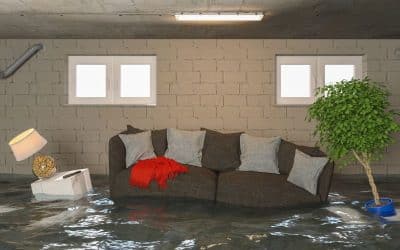Mold & Your Health – A Hidden Threat in Denver Homes
That persistent cough or unexplained headache might not be just another cold—it could be a sign of mold exposure in your home. For Denver residents, our unique climate creates perfect conditions for mold growth: dry winters that encourage indoor humidity control problems, surprisingly humid summers, and occasional flooding events that can leave moisture lingering in hidden spaces. When searching for “mold remediation near me,” understanding how mold affects your health is the first crucial step toward creating a safer home environment.
What Is Mold & Where Does It Hide?
Mold is a type of fungus that reproduces through tiny spores that float through the air. When these spores land on damp surfaces, they can quickly multiply and form colonies. Common household molds include Aspergillus, Penicillium, and the notorious Stachybotrys chartarum (black mold).
In Denver homes, mold commonly hides in:
- Bathrooms with poor ventilation
- Basements and crawl spaces
- Around leaky windows and roofs
- Behind drywall after water damage
- Under carpets in humid areas
- Around air conditioning units
- In attics with poor ventilation
Can Mold Make You Sick? Health Risks Explained
Yes, mold exposure can definitely make you sick. When mold spores are inhaled or come into contact with your skin, they can trigger various health responses. While not everyone is equally sensitive to mold, certain groups face higher risks:
- Children and infants
- Elderly individuals
- People with existing respiratory conditions
- Those with compromised immune systems
- Individuals with asthma or allergies
Even for healthy adults, prolonged exposure to some molds can lead to developing new sensitivities and health issues over time.
Common Symptoms of Mold Exposure You Shouldn’t Ignore
Mold exposure symptoms can be easily confused with seasonal allergies, colds, or flu. Here are key symptoms to watch for:
Respiratory Issues
- Persistent coughing or wheezing
- Shortness of breath
- Throat irritation
- Nasal congestion
- Sinus problems
Skin Reactions
- Itchy skin
- Rashes
- Hives
Neurological Symptoms
- Frequent headaches
- Difficulty concentrating
- Memory problems
- Dizziness
General Symptoms
- Unexplained fatigue
- Eye irritation (redness, watering)
- Increased asthma attacks in asthma sufferers
The challenging aspect of mold-related symptoms is their ability to develop slowly and mimic other conditions, making them easy to dismiss or misdiagnose.
A Denver Family’s Experience: The Hidden Danger
Consider the situation of the Martinez family in Denver’s Park Hill neighborhood. After moving into their 1960s home, their 8-year-old daughter began experiencing increased asthma attacks, while the parents developed persistent headaches and fatigue. They initially attributed these symptoms to seasonal allergies and work stress.
It wasn’t until a small water leak revealed mold behind their kitchen cabinets that they realized the hidden danger. After researching ‘mold remediation near me,’ the Martinez family contacted a certified professional who identified extensive mold growth in their basement following previous minor flooding. Their symptoms improved dramatically after professional mold remediation services addressed the problem.
Note: This is an illustrative example to demonstrate how mold exposure can affect Denver residents.
How to Check If Mold Is Making You Sick: When to Seek Help
If you suspect mold might be causing health issues:
- Track your symptoms: Note when they worsen (at home vs. elsewhere)
- Look for visible mold: Check common hiding places
- Consider timing: Did symptoms begin after water damage?
- Consult a healthcare provider: Mention your mold concerns
- Consider indoor air quality testing: Professional testing can confirm suspicions
Remember that symptoms often improve when you’re away from home and worsen upon return if mold is the culprit.
Why Professional Mold Remediation Is Crucial
While DIY removal might seem cost-effective for small areas, it comes with significant risks:
- Improper removal can spread spores further
- Without addressing the moisture source, mold will return
- DIY methods rarely remove hidden mold
- Exposure during removal can worsen health issues
- Many store-bought cleaners mask rather than eliminate mold
Professional mold remediation services use specialized equipment, containment procedures, and thorough remediation protocols that address both the mold and its moisture source.
Finding Trusted Mold Remediation Near You in Denver
When searching for “mold remediation nearby” in Denver, consider:
- Certifications: Look for IICRC certification or similar credentials
- Experience: Companies familiar with Denver’s unique climate challenges
- Comprehensive approach: Those who identify and fix moisture sources
- Reviews: Check what other Denver residents have experienced
- Detailed protocol: Professionals should explain their complete process
- Testing capabilities: Pre and post-remediation testing ensures effectiveness
The right professional will prioritize your health while efficiently solving your mold problem.
Don’t Risk Your Health – Act Early
Mold exposure symptoms shouldn’t be ignored or dismissed as normal allergies or stress. For Denver residents, our climate creates unique challenges that make professional intervention particularly important. If you’re experiencing unexplained health issues that worsen at home, visible mold growth, or have had recent water damage, it’s time to consider professional mold remediation near me services to protect your family’s health and your home’s integrity.
At Nubilt Restoration & Construction, we understand the serious health impacts mold can have on Denver families. Our certified technicians use advanced techniques to safely remove mold and prevent its return by addressing the root moisture issues. Don’t let mold compromise your family’s health—contact us today for a thorough inspection and effective remediation plan tailored to your home’s specific needs.
Contact us to learn more about our comprehensive mold remediation services.






